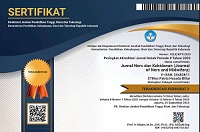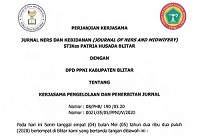Self-Efficacy Correlated with Diarrhea Prevention Behaviors
DOI:
https://doi.org/10.26699/jnk.v10i3.ART.p373-379Keywords:
self-efficacy, preventive behavior, diarrheaAbstract
Diarrhea is a gastrointestinal disease with extraordinary events (KLB) that requires special attention because the high morbidity and death rates are still a health problem for people worldwide, especially in developing countries like Indonesia. It happens because of the low correlation of self-efficacy in implementing diarrhea prevention behaviors. This research aimed to determine the correlation between self-efficacy and diarrhea prevention behavior in the work area of Kalianget Health Center. The type of the research was quantitative with an analytical observational design with a cross-sectional approach. The population was 217 respondents suffering from Diarrhea and the sample was 67 respondents taken by simple random sampling. The data collection used questionnaires. Test analysis using Spearmen rank test. This research showed that as many as 47 respondents (70.1%) had a moderate level of Self-efficacy, while most respondents had behavior Diarrhea prevention in the sufficient category 48 respondents (71.6%). Analysis of the data obtained there was a correlation between self-efficacy and preventive behavior Diarrhea in the working area of Kalianget Health Center. Prevention of Diarrhea in people with Diarrhea can be done by increasing self-efficacy so that diarrhea prevention behavior can be carried out properly and correctly to reduce the incidence of Diarrhea in the community
References
Agustin, R. A. (2019). PERILAKU KESEHATAN ANAK SEKOLAH . Jember: CV. Pustaka Abadi.
Alligood, M. (2014). Nursing Theorists AND THEIR WORK. Deborah L. Vogel.
Apriani, D., & Sastra, D. (2022). Gambaran Tingkat Pengetahuan Ibu Tentang Diare Pada Balita Di Kelurahan Baler Bale Agung Kabupaten Jembrana Tahun 2021. Journal of Health and Medical Science, 16.
Ariani, & Putri, A. (2019). Diare Pencegahan Dan pengobatannya. Yogyakarta: Nuha Medika.
Arikunto, S. (2013). Prosedur Penelitin. Jakarta: Rineka Cipta.
Astuti, R., & Syahreni, E. (2013). SELF-EFFICACY IBU DALAM UPAYA PENCEGAHAN DIARE PADA ANAK USIA KURANG DARI 5 TAHUN. Jurnal Keperawatan Indonesia, 184.
Chairina, R. (2019). ANALISIS MANAJEMEN SUMBER DAYA MANUSIA (STUDI KASUS KINERJA PERAWAT RUMAH SAKIT). Sidoarjo: Zifatama Jawara.
Dinkes Sumenep. (2020). Hasil Riset Kesehatan Kabupaten Sumenep. Sumenep.
Ferasinta , R. N. (2022). Konsep Dasar Keperawatan Anak. Aceh : Yayasan Penerbit Muhammad Zaini.
Hidayatullah, S., & Dr. Fadhilah, M. (2019). BAHAN AJAR MIKROBIOLOGI NOROVIRUS. Ponorogo: Uwais Inspirasi Indonesia.
Indra , I., & Cahyaningrum, I. (2019). METODOLOGI PENELITIAN. Sleman: CV BUDI UTAMA.
Intan Fazrin, A. (2022). Mother's Knowledge with Self Efficacy in Handling Diarrhea for Toddlers. Quality in Public Health , 17-23.
Kambu, Y., & Azinar, M. (2021). Perilaku Pencegahan Diare Pada Balita. Indonesian Journal of Public Health and Nutrition, 776-782.
Kartika, D., & Murti , S. (2019). Multilevel Analysis on the Contextual Effects of Hygiene Environmental Sanitation, and Diarrhea Prevention in Elementary School Students in Ngawi, East Java. Journal of Epidemiology and Public Health, 97-108.
Kemenkes RI. (2019). Hasil Utama Riset Kesehatan Dasar Tahun 2018. Jurnal Ilmiah Kesehatan, 97.
Kimilaningsih, N. K. (2019). Hubungan Kepercayaan Diri Dengan Perilaku Pencegahan Diare Pada Ibu Bayi Di Puskesmas II Denpasar Barat Tahun 2019.
Maryanti, E., Januarina, N., & Napitupulu, L. (2022). FAKTOR PEMICU TERJADI DIARE BERDASARKAN KEPADA SANITASI LINGKUNGAN. Surabaya: Global Aksara Pres.
Maulana, H. (2009). Promosi Kesehatan. Jakarta: Buku Kedokteran EGC.
Nursalam. (2020). Metodologi Penelitian Ilmu Keperawatan. Jakarta Selatan: Salemba Medika.
Oliviera, & Sumampouw. (2019). Diare Akut pada Balita di Puskesmas Tanah Kali Kedinding Surabaya. Jurnal Ilmiah Kesehatan, 97.
Pakpahan at.al, M. (2021). Promosi Kesehataan & Perilaku Keseahatan. Jakarta: Yayasan kita menulis.
Rachmat, N. (2021). Optimasi Performa Kualitas Hidup Pada Pasien Post Amputasi Transfemoral. Ponorogo: Gracias Logis Kreatif.
Ranjit, K. (2019). Research Methodology. Jakarta: Sage Publication Limited.
Rima Trianingsih, M. (2018). APLIKASI PEMBELAJARAN KONTEKSTUAL YANG SESUAI PERKEMBANGAN ANAK USIA SEKOLAH DASAR. Banyuwangi: LPPM Institut Agama Islam Ibrahimy Genteng Banyuwangi.
Sabil, D. (2023). Efikasi Diri Membangun Kesuksesan Dalam Manajemen Perbankan. Yogyakarta, Makassar: PT. Nas Media Indonesia.
Saputro, W., & Herawati, L. (2013). PERILAKU HIDUP BERSIH DAN SEHAT (PHBS) DENGAN KEJADIAN. Perilaku Hidup Bersih Dan Sehat, 41.
Soegijanto, S. (2016). KUMPULAN MAKALAH Penyakit Tropis dan Infeksi di Indonesia Jilid 7 . Surabaya: Airlangga University Press.
Sumampouw, D. (2017). DIARE BALITA. Sleman: CV BUDI UTAMA.
Susanti, E., Manulu, N., & Munandar , A. (2022). KEPERAWATAN PERIOPERATIF DAN MEDIKAL BEDAH. Bandung: MEDIA SAINS INDONESIA.
Downloads
Published
How to Cite
Issue
Section
License
Copyright (c) 2023 Jurnal Ners dan Kebidanan (Journal of Ners and Midwifery)

This work is licensed under a Creative Commons Attribution-ShareAlike 4.0 International License.






